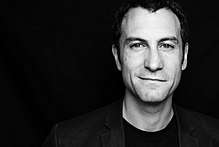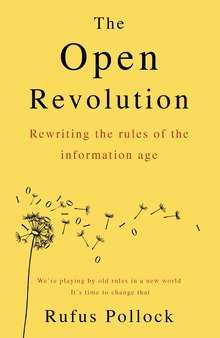Rufus Pollock
Rufus Pollock (born 1980) is an economist and founder of Open Knowledge International. He is a Shuttleworth Foundation alumnus,[1][2][3], an Ashoka Fellow[4], an Associate of the Centre for Intellectual Property and Information Law at the University of Cambridge[3] and President of Open Knowledge International[3] which he founded (as the Open Knowledge Foundation) in 2004 and served as a board director until 2013. He continues to act as Board Secretary.[3] In addition to his academic work, whilst at Open Knowledge International he initiated a wide variety of projects, many of which continue to be active today. For example, in 2005 he created The Open Definition which provided the first formal definition of open content and open data, and which has remained the standard reference definition. In 2005–2006 he created the first version of CKAN, open source software for finding and sharing datasets, especially open datasets. CKAN has continued to evolve and today is the leading open data platform software in the world used by governments including the US and UK to publish millions of public datasets.
Rufus Pollock | |
|---|---|
 Rufus Pollock in 2017 | |
| Born | 1980 (age 39–40) |
| Alma mater | University of Cambridge |
| Scientific career | |
| Thesis | Should We Give Every Cow Its Calf? Monopoly, Competition and Transaction Costs in the Promotion of Innovation and Creativity (2008) |
| Doctoral advisor |
|
| Website | rufuspollock |
Work
On 24 May 2004 Pollock founded in Cambridge, UK the Open Knowledge Foundation[5][6] as a global non-profit network that promotes and shares open knowledge including open data and open content - information that is openly and freely available.[7]
In 2007 and 2009, Pollock published two important papers regarding the optimal copyright term, where he proposed based on an economical model with empirically-estimable parameters an optimal duration of only 15 years, significantly shorter than any currently existing copyright term.[8][9]
He has held the Mead Research Fellowship in economics at Emmanuel College, Cambridge.[10]
In 2009, he was credited by web inventor Tim Berners-Lee for starting the Raw Data Now meme.[11]
In 2010 he was appointed as one of the four founding members of the UK Government's Public Sector Transparency Board.[12][13]
Bibliography

- The Open Revolution: Rewriting the rules of the information age (2018)[14]
References
- "Shuttleworth Fellowship". Rufus Pollock. Retrieved 20 January 2011.
- "Rufus Pollock ─ Open data, open knowledge". Shuttleworth Foundation. Retrieved 20 January 2011.
- "Open Knowledge: Staff". Retrieved 21 February 2015.
- "Rufus Pollock". ashoka.
- "Open Knowledge Foundation launched". Open Knowledge Foundation Weblog. Retrieved 25 October 2015.
- Davies, Tim (12 April 2014). "Data, information, knowledge and power – exploring Open Knowledge's new core purpose". Tim's Blog. Retrieved 25 October 2015.
- "Open Knowledge: About". okfn.org. Retrieved 25 October 2015.
- Rufus Pollock (1 October 2007). "Optimal copyright over time: Technological change and the stock of works" (PDF). University of Cambridge. Archived from the original (PDF) on 21 February 2013. Retrieved 11 January 2015.
The optimal level for copyright has been a matter for extensive debate over the last decade. Using a parsimonious theoretical model this paper contributes several new results of relevance to this debate. In particular we demonstrate that (a) optimal copyright is likely to fall as the production costs of 'originals' decline (for example as a result of digitization) (b) technological change which reduces costs of production may imply a decrease or a decrease in optimal levels of protection (this contrasts with a large number of commentators, particularly in the copyright industries, who have argued that such change necessitates increases in protection) (c) the optimal level of copyright will, in general, fall over time as the stock of work increases.
- Rufus Pollock (15 June 2009). "Forever minus a day? Calculating optimal copyright term" (PDF). University of Cambridge. Archived from the original (PDF) on 12 January 2013. Retrieved 11 January 2015.
The optimal term of copyright has been a matter for extensive debate over the last decade. Based on a novel approach we derive an explicit formula which characterises the optimal term as a function of a few key and, most importantly, empirically-estimable parameters. Using existing data on recordings and books we obtain a point estimate of around 15 years for optimal copyright term with a 99% confidence interval extending up to 38 years. This is substantially shorter than any current copyright term and implies that existing terms are too long.
- "Mr Rufus Pollock". University of Cambridge. Archived from the original on 8 July 2013. Retrieved 4 December 2010.
- Tim Berners-Lee. "Credits for Linked Data talk at TED, 2009". World Wide Web Consortium. Retrieved 8 February 2012.
- "About". Rufus Pollock. 15 October 2013. Retrieved 21 February 2015.
- "Public Sector Transparency Board". GOV.UK. Retrieved 21 February 2015.
- "The Open Revolution: Rewriting the rules of the information age".
External links
- Personal website and autobiography
- Interview with Guardian.co.uk
- Give Us the Data Raw, and Give it to Us Now ─ the blog post from Rufus Pollock that inspired Tim Berners-Lee
- Open Knowledge International
- Shuttleworth Fellowship
- Ashoka Fellowship
- CKAN Project
- Digital Revolution Talk at re:publica
- Building a Sustainable Digital Age Talk in Geneva
- Access of Knowledge Video by WeShift
- A Better World Video
- Frictionless Data Video and blogpost
- Thoughts on Blockchain Video and article